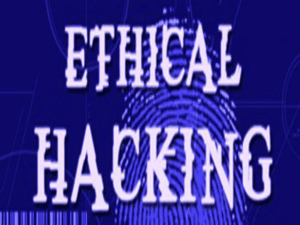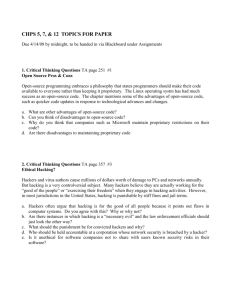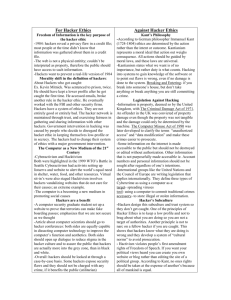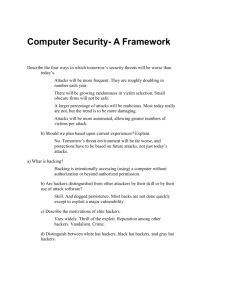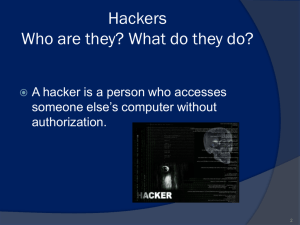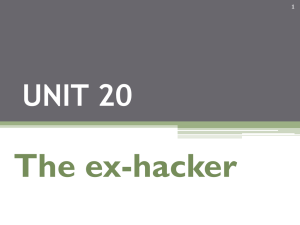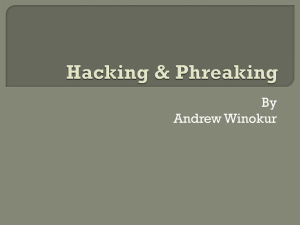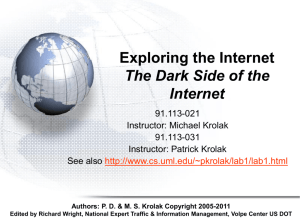Hacking
advertisement
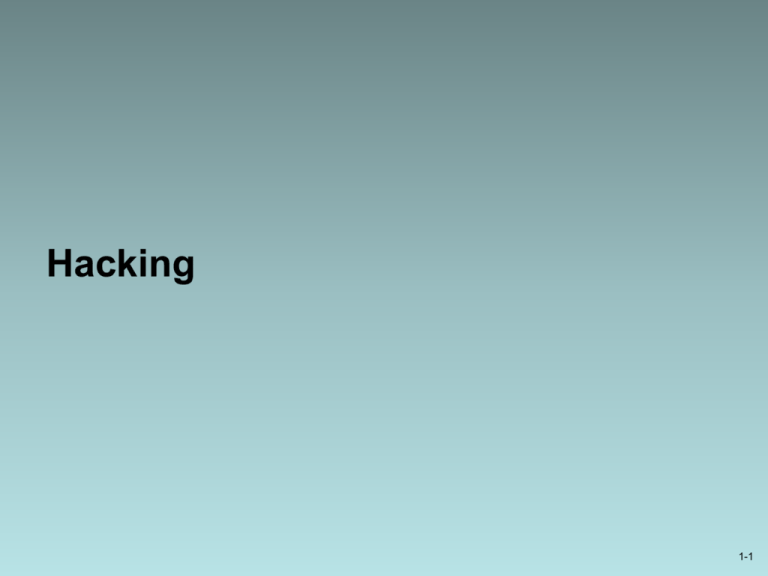
Hacking 1-1 Hackers, Past and Present • Original meaning of hacker: explorer, risk taker, system innovator – MIT’s Tech Model Railroad Club in 1950s • 1960s-1980s: Focus shifted from electronics to computers and networks – 1983 movie WarGames • Modern meaning of hacker: someone who gains unauthorized access to computers and computer networks 1-2 Hackers (Levy’s Classic) • From Steven Levy’s Hackers, a history of early hacker culture. – “True” Hackers • MIT – Hardware Hackers • West Coast – Game Hackers 6-3 Obtaining Login Names and Passwords • • • • Eavesdropping Dumpster diving Social engineering Keystroke listeners 1-4 Computer Fraud and Abuse Act • Criminalizes wide variety of hacker-related activities – – – – – – Transmitting code that damages a computer Accessing any Internet-connected computer without authorization Transmitting classified government information Trafficking in computer passwords Computer fraud Computer extortion • Maximum penalty: 20 years in prison and $250,000 fine 1-5 Sidejacking • Sidejacking: hijacking of an open Web session by capturing a user’s cookie • Sidejacking possible on unencrypted wireless networks because many sites send cookies “in the clear” • Internet security community complained about sidejacking vulnerability for years, but ecommerce sites did not change practices 1-6 Case Study: Firesheep • October 2010: Eric Butler released Firesheep extension to Firefox browser • Firesheep made it possible for ordinary computer users to easily sidejack Web sessions • More than 500,000 downloads in first week • Attracted great deal of media attention • Early 2011: Facebook and Twitter announced options to use their sites securely 1-7 Utilitarian Analysis • Release of Firesheep led media to focus on security problem • Benefits were high: a few months later Facebook and Twitter made their sites more secure • Harms were minimal: no evidence that release of Firesheep caused big increase in identity theft or malicious pranks • Conclusion: Release of Firesheep was good 1-8 Kantian Analysis • Accessing someone else’s user account is an invasion of their privacy and is wrong • Butler provided a tool that made it much simpler for people to do something that is wrong, so he has some moral accountability for their misdeeds • Butler was willing to tolerate short-term increase in privacy violations in hope that media pressure would force Web retailers to add security • He treated victims of Firesheep as a means to his end • It was wrong for Butler to release Firesheep 1-9 Cyber Crime • Criminal organizations making significant amounts of money form malware • Jeanson James Ancheta • Pharmamaster • Albert Gonzalez • Avalanche Gang 1-10 The Rise and Fall of Blue Security Part I: The Rise • Blue Security: An Israeli company selling a spam deterrence system • Blue Frog bot would automatically respond to each spam message with an opt-out message • Spammers started receiving hundreds of thousands of opt-out messages, disrupting their operations • 6 of 10 of world’s top spammers agreed to stop sending spam to users of Blue Frog 1-11 The Rise and Fall of Blue Security Part II: The Fall • One spammer (PharmaMaster) started sending Blue Frog users 10-20 times more spam • PharmaMaster then launched DDoS attacks on Blue Security and its business customers • Blue Security could not protect its customers from DDoS attacks and virus-laced emails • Blue Security reluctantly terminated its anti-spam activities 1-12 Politically Motivated Cyber Attacks • • • • • • Estonia (2007) Georgia (2008) Georgia (2009) Exiled Tibetan Government (2009) United States and South Korea (2009) Stuxnet Worm (2009) 1-13 Attacks on Twitter and Other Social Networking Sites • Massive DDoS attack made Twitter service unavailable for several hours on August 6, 2009 • Three other sites attacked at same time: Facebook, LiveJournal, and Google • All sites used by a political blogger from the Republic of Georgia • Attacks occurred on first anniversary of war between Georgia and Russia over South Ossetia 1-14 Fourth of July Attacks • 4th of July weekend in 2009: DDoS attack on governmental agencies and commercial Web sites in United States and South Korea • Attack may have been launched by North Korea in retaliation for United Nations sanctions 1-15 Video: History of Hacking: • Discovery Channel - History of Hacking – 50 minutes – Hacker, Crackers, … • Robert Draper (Captain Crunch) • Steve Wozniak • Kevin Mitnick Slide 4- 16

